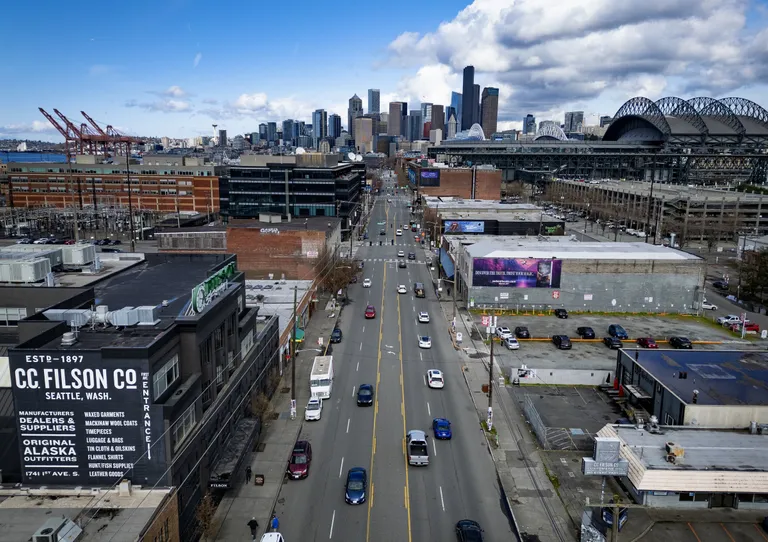by
David Kroman
Seattle Times staff reporter
The Port of Seattle is petitioning a judge to overturn Seattle’s recently passed rezone to allow housing on the edges of the city’s industrial district.
The port’s main argument is the city’s legislation almost entirely benefits one person, Chris Hansen, who owns the parcels near T-Mobile Park that are most likely to see new development following the bill’s passage. The port argues the bill should have gone through more evaluation and that housing is an incompatible use of industrial property, the petition says.
If successful, the petition, filed in King County Superior Court, would invalidate the new law, passed last month.
The port’s petition is another volley in what’s become one of the most tense fights within City Hall in years. The law in question was introduced late last year, but the fight has its roots in decades of friction between the port and the city over how to regulate industrial areas.
The law, which passed 6-3, rezoned the underused parcels just south of the baseball stadium to allow for the construction of up to 990 apartments. Council President Sara Nelson, the bill’s sponsor and most zealous proponent, said new development there would not only represent a small dent in the city’s larger housing crisis but also be a catalyst for the long-sought “maker’s district” near the stadiums, in which small-scale artisan manufacturers could have space to set up their businesses.
The bill ran into intense opposition. Maritime and industrial interests in the area have long opposed new housing in Sodo, arguing it would impede the flow of goods to the area and create a feedback loop of pressure on future elected officials to suppress industry in the area. In 2023, the Port of Seattle threatened to blow up a larger agreement regulating maritime and industrial land use unless housing was barred from these same properties. Nelson’s proposal was viewed as a betrayal of that agreement.
“In its haste to advance the proposal, the Council summarily disposed of longstanding protections the City has afforded to industrial uses, all in order to open the door for a single housing project,” the petition reads.
Despite some apocalyptic predictions about what the housing would mean for the port’s future, the bill ended up passing, with members citing the city’s studies that suggested the impact would be minimal. Port commissioners urged Mayor Bruce Harrell to veto the bill, despite it passing with a veto-proof six votes. Harrell instead returned the bill unsigned — allowing it to go into law, but remaining neutral on its merits.
As the bill progressed through the committee process, the Port of Seattle and its umbrella Northwest Seaport Alliance issued vague legal threats, arguing the city ought to be doing more environmental review under the State Environmental Policy Act.
Thursday’s petition makes good on some of the threats. Because the bill constitutes what it views as a rezone of a specific property, the port argues the city should have had to go through more environmental review and given interested parties more avenues to appeal.
The port also argues that a rezone of this type is illegal when the property in question is for a substantially different use than the surrounding area — in this case, housing being incongruent with industry.
The petition also repeatedly suggests the council’s consideration of the bill was illegal. Rezone conversations are often considered quasi-judicial and communication with interested parties is severely restricted. Although the petition does not say directly that members of the council had communications with Hansen and his associates, it says if they did, that could have been illegal.
The Port of Seattle has struggled to recover moving as many volumes as before the pandemic. Shipment numbers improved last year, but the port lost market share to other West Coast ports, according to internal numbers provided by Commissioner Fred Felleman. It’s also working to find new uses for its underused Terminal 46.
A spokesperson for the city did not immediately respond to a request for comment. A representative for Vipond Group, which manages Hansen’s properties, said he had not yet reviewed the petition.
David Kroman: 206-464-3196 or dkroman@seattletimes.com. Seattle Times staff reporter David Kroman covers Seattle City Hall.
